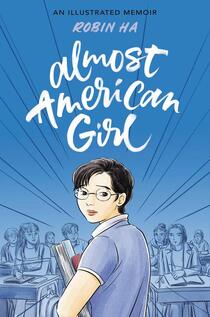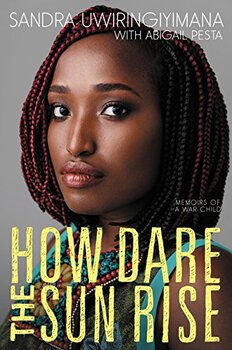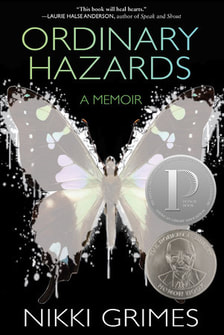Dr. Cindi Koudelka (@cmkoudelka) is a Curriculum Specialist with National Board Certification in Adolescent Young Adulthood/English Language Arts at Fieldcrest School District in Illinois and an Adjunct faculty member at Aurora University. She holds multiple certifications from PreK - 12 and is an active member in several literacy and research organizations. Her research interests reflect her passion for youth advocacy by focusing on critical adolescent literacies, young adult literature, positioning, and youth participatory action research. |
Finding Myself in the Stories of Others by Dr. Cindi Koudelka
The number one journey adolescents undertake is the one searching for their identity. Those of us who have had the joy of working with young adolescents know that this quest is fraught with highs and lows, giggles and tears, and a wide range of emotions in between. That is why one of my favorite units to teach was our “Memoir” unit. It begins with exploration of poetry, songs, and short stories in which we use the mentor texts to examine how authors tell their stories. We write beside them to practice narrative techniques and begin reflecting on our own values, beliefs, and identities. From there, we take advantage of one of the best aspects of young adult literature—catalyzing identity growth and empathy development in book clubs featuring a range of memoirs for teens to explore. They focus on the author’s narrative craft, but they also are asked to think about how others’ stories help us understand ourselves and transform the world. Over the years, I have used a variety of books, but in trying to assure an inclusive set of options, these are a few of my favorites I have added recently.
| Almost American Girl: An Illustrated Memoir by Robin Ha One of the important understandings I want for my students is that memoirs can take many forms and that everyone has a story to tell. This beautiful Graphic Novel tells Robin’s story of her immigration from Seoul, Korea to Huntsville, Alabama. As she struggles to fit in with her new stepfamily and maintain the bond she had with her mother, she discovers how drawing gives her an opportunity to find her identity, navigate those family bonds, and create a new future. |
| How Dare The Sun Rise by Sandra Uwiringiyimana with Abigail Pesta Sandra Uwiringiyimana describes her journey from the wartorn Democratic Republic of the Congo to a college student in America. She beautifully juxtaposes images of her happy childhood with the ugly reality of war. At ten, her family escaped to a refugee camp, but that did not provide the safety they sought. Instead, her sister was killed and mother shot in front of her during a raid on the camp. One of the rebels held a gun to her head but didn’t shoot, leaving her to go on the run with her remaining family members. Sandra overcame her trauma through art and activism. Her family ended up in America and she entered Middle School and struggled to find her place and heal from her trauma. Through participation in activism, she has found her voice and tells her story to help educate people about the plight of refugees and works with organizations that help support lasting solutions. |
| Ordinary Hazards by Nikki Grimes Nikki Grimes has filled my heart with such beautiful words over the years, and this memoir in verse is no exception. She uses the power of her writing to explore the hazards and pain from her life. Often we have no idea of the pain our students are suffering due to the types of trauma that Nikki bravely shares with her readers. Her story not only details the tragic relationships and events of her early life, but how she discovered writing at age 6 as a way to cope with the pain and use her words as a way to heal. This book is a must read for teachers to understand what it is like for students living in trauma and for students who are facing their own hazards. As a memoir, it is a powerful telling of how the events of her life shaped her identity and a beautiful mentor text in a memoir unit. |
Even though this was first published in 2003, Louise’s story holds up for readers as she shares the harrowing tale of her experiences in the foster-care system. What I appreciate about the memoir unit is that by including an array of stories, all students can see the diversity in humanity and come to think about their own stories as they empathize with her pain and courage.
The strength Louise found partially came from an experience with a caring counselor. From this, teachers can come to further understand the absolute importance of building caring relationships with students. But it is her own fortitude that anchors the story, the nature of human spirit and resilience that allows her to confront her past in order to move forward.
Travels Through Aqua, Green, and Blue: A Memoir by Mary E.Gregory
Sometimes trauma isn’t something that happens to us, but we are still inextricably tied to the trauma caused by the world around us. For Mary Gregory, her life was uprooted when her father, a well-respected preacher in her hometown in Tennessee, came out as a gay man. Mary's mother takes the children to New York and then to various locations often living in poverty. As her mother’s mental health grows more unstable, the children are dragged across the country without fully understanding the situation around them. Her memoir, often written in diary format, is a poignant telling of a life where trauma comes from the outside but still requires resiliency and inner reflection to understand how to ultimately find stability.
Obsessed: A Memoir of My Life with OCD by Allison Britz
When we think of OCD, we may picture the germaphobe or someone like Sheldon Cooper from The Big Bang Theory. However, OCD can take many forms as this beautiful memoir details. Britz shares how her struggle with OCD began after a nightmare during her sophomore year in high school and grew to avoiding sidewalk cracks, counting steps, avoiding hair dryers, calculators, cell phones, computers, anything green, bananas, oatmeal, and most of her own clothing. Her teachers and parents could not understand this change, and it wasn’t until she finally asked for help that she was diagnosed and began to get the support she needed to cope with her illness.
This memoir is an important one to include in the unit to share with students in discussing the idea that mental health challenges can come from anywhere and how to empathize and support people facing such challenges.
Apple: (Skin to the Core) by Eric Gansworth
I had never heard the term apple being applied to people. When I saw the cover of Gansworth’s book, I didn’t understand where the title came from until I read his powerful words. Apple is a slur in Native communities for someone supposedly red on the outside, white on the inside. Gansworth delves into the government boarding schools and explores how he needed to balance his worlds of living as an outsider, first as an Onondaga among Tuscaroras and then aging out of the reservation schools. His beautiful poetry and accompanying illustrations create a memoir that helps the students examine how systemic injustice shapes identity and can only be overcome through the power of voice.
Brave Face: A Memoir by Shaun David Hutchinson
What I appreciated about this Hutchinson’s book is the raw honesty about his coming to terms with his identity and sexuality. He begins describing how he never felt like he fit in and he talks about the societal messages in pop culture convinced him that it being gay would prevent him from finding love or happiness. This led to a deep depression that compounded his search for acceptance, especially from himself. Not only does he write from his perspective today, but he includes diary entries and past writings that deliver a gut-punch to the reader and makes Shaun’s eventual self-acceptance and finding his place in the world that much sweeter. Part of this book’s power comes from Hutchinson’s in-depth exploration of his depression and self-harm, which may be triggering for some students without proper support.
A Game for Swallows: To Die, To Leave, To Return by Zeina Abirached
American Born Chinese Paperback by Gene Luen Yang
Americanized: Rebel Without a Green Card by Sara Saedi
Bad Boy by Walter Dean MyersDare to Disappoint by Ozge Samancin
Becoming Maria: Love and Chaos In The South Bronx by Sonia Manzano
Being Jazz: My Life as a (Transgender) Teen by Jazz Jennings
Broken Memory: A Novel of Rwanda by Elisabeth Combres
Brown Girl Dreaming by Jacqueline Woodson
Do You Dream in Color? Insights From A Girl Without Sight by Rubin, Laurie
El Deafo by Cece Bell
Every Falling Star by Sungju Lee
First They Killed My Father: A Daughter of Cambodia Remembers by Loung Ung
Hey, Kiddo by Jarrett J. Krosoczka
Hidden Girl by Shyima Hall
Hole in My Life by Jack Gantos
How I Discovered Poetry by Marilyn Nelson
I Am Malala: How One Girl Stood Up for Education and Changed the World (Young Readers
Edition) by Malala Yousafzai and Patricia McCormick
I Know Why The Caged Bird Sings by Maya Angelou
Inside Out and Back Again by Thanhhà Lai
It's Trevor Noah: Born a Crime: Stories from a South African Childhood by Trevor Noah
Laughing At My Nightmare by Shane Burcaw
March by John Lewis, Andrew Aydin, Nate Powell
Maus by Art Spiegelman
Rethinking Normal by Katie Rain Hill
Some Assembly Required by Arin Andrews
Taking Flight by Michaela DePrince





 RSS Feed
RSS Feed